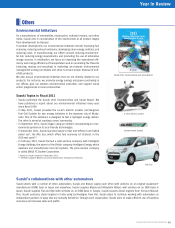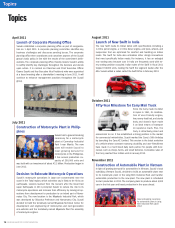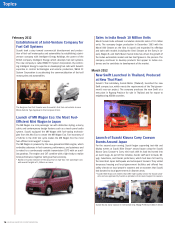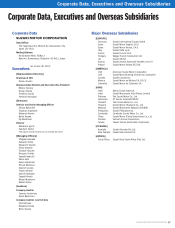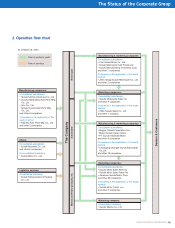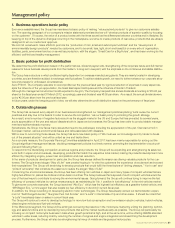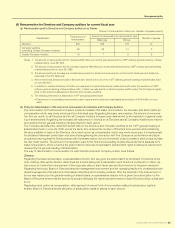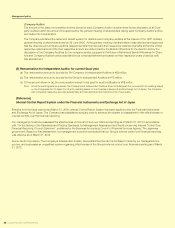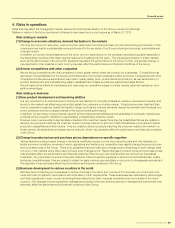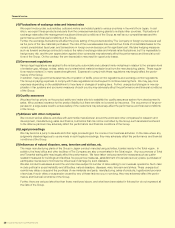Suzuki 2012 Annual Report Download - page 23
Download and view the complete annual report
Please find page 23 of the 2012 Suzuki annual report below. You can navigate through the pages in the report by either clicking on the pages listed below, or by using the keyword search tool below to find specific information within the annual report.
Management policy
SUZUKI MOTOR CORPORATION 21
Management policy
SUZUKI MOTOR CORPORATION 21
1. Business operations basic policy
Ever since establishment, the Group has maintained a basic policy of making “value-packed products” to give our customers satisfac-
tion. The opening paragraph of our company’s mission statement promises that we will “develop products of superior quality by focusing
on the customer”. Of course, the value of a product varies with the times as well as the differences between countries and in lifestyles. By
keeping on top of the dynamic changes occurring in the marketplace, we strive to create products of real value, products that are always
designed to win our customers’ approval.
We commit ourselves to make efforts to promote the “production of mini, small and subcompact vehicles” and the “development of
environmentally benign products” needed by customers, and to be small, less, light, short and beautiful on every side of organization,
facilities, parts, environment and so on as well as production, with the slogan, “Small Cars for a Big Future”, and has been working for the
efficient, well-knit and healthy management.
2. Basic policies for profit distribution
We determine the profit distribution based on the performances, dividend payout ratio, strengthening of the corporate nature and full internal
reserve for future business developments from the medium- to long-term viewpoint, with the emphasis on the continuous and stable distribu-
tion.
The Group has a structure in which profits are highly dependent on overseas manufacturing plants. They are mainly located in developing
countries, and are therefore subject to exchange rate fluctuations. To achieve stable growth, we need to further enhance our corporate struc-
ture and prepare for unforeseen circumstances.
As to FY2011, The Company was able to record profits over the previous fiscal year by vigorous reduction of expenses in every aspect de-
spite the influence of the yen appreciation, the Great East Japan Earthquake and the influence of floods in Thailand.
Although the management environment is still expected to be grim, The Company has paid total annual dividends amounting to ¥15.00 per
share for the fiscal year ended 31 March 2012, accordingly, year-end dividend was ¥8.00 per share. As a result, the annual dividends were
up by ¥2.00 per share from the previous fiscal year.
In future years, under the foregoing point of view, we will also determine the profit distribution based on the performance of fiscal year.
3. Outstanding issues
The Group has reviewed every aspect of our business and strengthened our management practices placing “Let’s review the current
practices and stay true to the basics in order to survive the competition.” as our basic policy in promoting the growth strategy.
As a result, amid a number of negative factors such as the sluggish market in the US and Europe that has prevailed for several years,
acute appreciation of the yen and natural disasters both in Japan and at overseas, the Group has been able to conduct stable manage-
ment and achieve steady recovery.
Nonetheless, the Group now faces many issues that need to be addressed, including the appreciation of the yen, financial turmoil in
European market, various environmental issues and risks associated with disasters.
With a view to overcoming those issues, the Group has set a new basic policy of “We must use our knowledge and try harder to break
out of the present situation” and will be united as one and tackle them.
As a concrete measure, the Corporate Planning Committee established in April 2011 has been mainly responsible for sorting out the
Group’s significant management issues, deciding management policies in a timely manner, promoting the implementation of such poli-
cies and following them up.
To respond to the intensifying competition at various regions and products, the Group will be expanding and strengthening its sales net-
work both in Japan and at overseas, developing products that match the respective local market, making its products development more
efficient by integrating engine, power train and platform and cost reduction.
In the arena of products development in particular, the Group has always defined its mission as offering valuable products for the cus-
tomers. The Group’s brand slogan “Way of Life!” was created hoping to “to offer the customers the experience of excitement and exceed
their expectations” The Group will be striving to develop products that would fulfill the three factors of “driving pleasure,” “fun to use” and
“pride of ownership” that constitute the essence to realize the slogan “Way of Life!”
Concerning the environmental issues, the Group has been offering mini vehicles in Japan and many types of compact vehicles that are
highly fuel-efficient in places like India and other Asian countries. The Group believes that a spread of such compact vehicles would be
one of the best ways to contribute to solving the environmental issues. Going forward, the Group will continue trying to improve the fuel
efficiency of compact vehicles by various measures such as maintaining its “No. 1 position in fuel efficiency” in the mini vehicles market.
To give some concrete examples, the Group launched “Alto Eco,” which has the highest fuel efficiency as a gasoline-fueled vehicle, and
“MR Wagon Eco,” a mini wagon that also boasts top fuel efficiency in its kind in current fiscal year.
In addition, the Group is working on developing electric motor technologies. The Group has already carried out demonstration experi-
ment of “Swift Range Extender,” “Burgman Fuel Cell Scooter” and “e-Let’s” in Hamamatsu City and other areas. It should be noted that
“e-Let’s” has already been on sales in current fiscal year.
The Group will continue to work to develop technology for more low-fuel consumption and low-emission electric vehicles, hybrid vehicles,
diesel engine vehicles and fuel-cell vehicles.
In the Motorcycle segment, the Group will be aiming at recovering its presence in the motorcycle market by uniting the planning, technol-
ogy and sales functions and by developing new products that suit the market needs as early as possible. The Group will particularly be
focusing on compact motorcycle business in Asia where growth potential is high, and at the same time, will be offering ASEAN-standard
vehicles in wider areas, reducing cost by reducing the number of engines and engine integration and streamlining the development
process. Furthermore, the Group will also be strengthening its lineup of middle and large-sized motorcycles.




